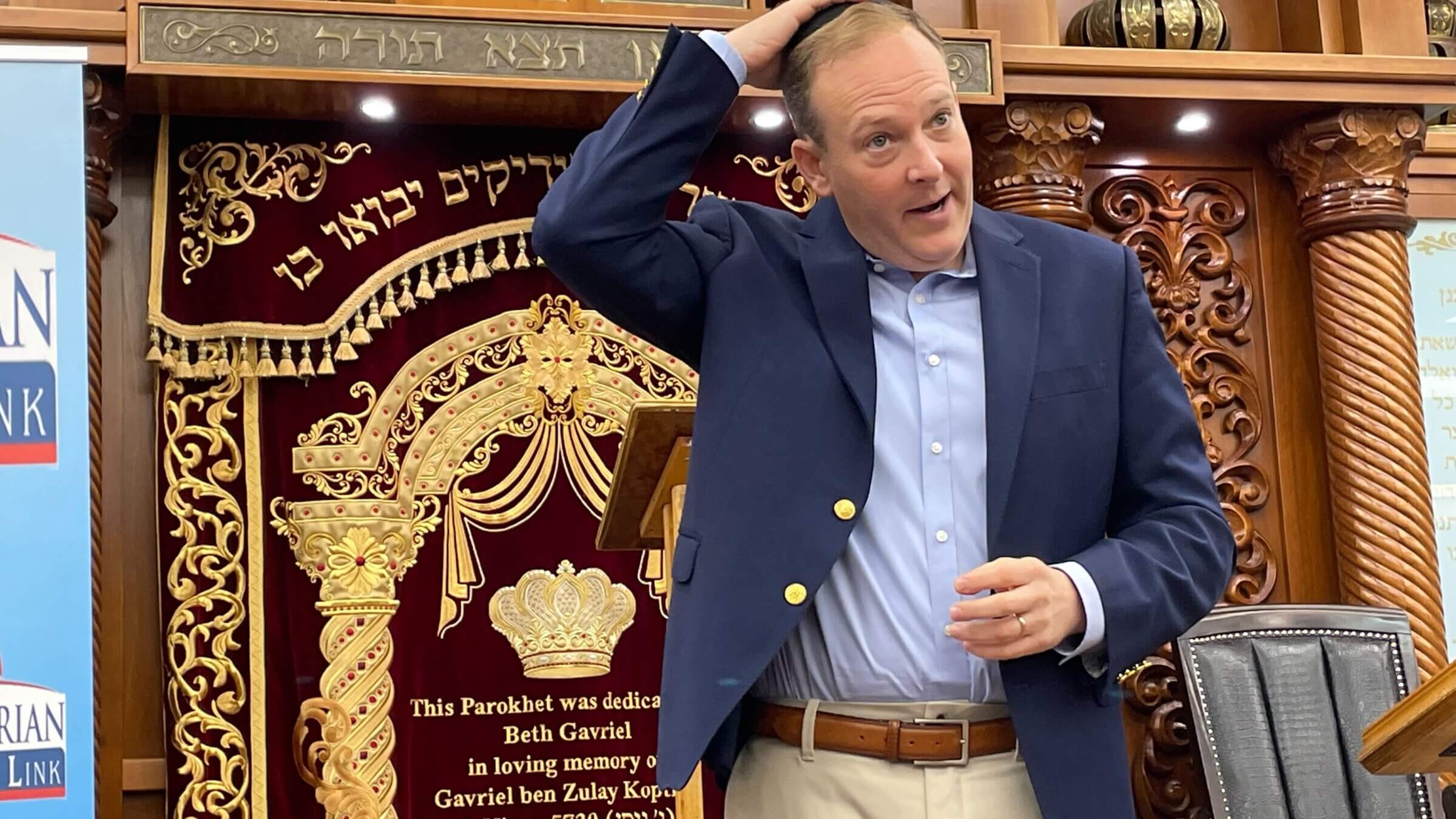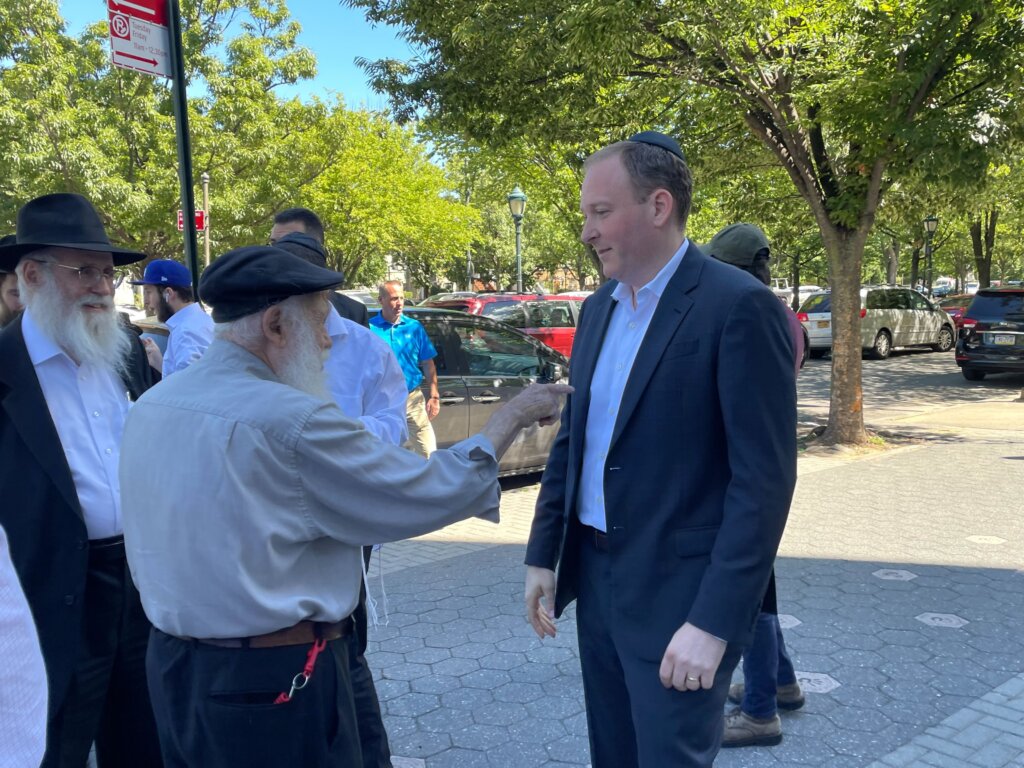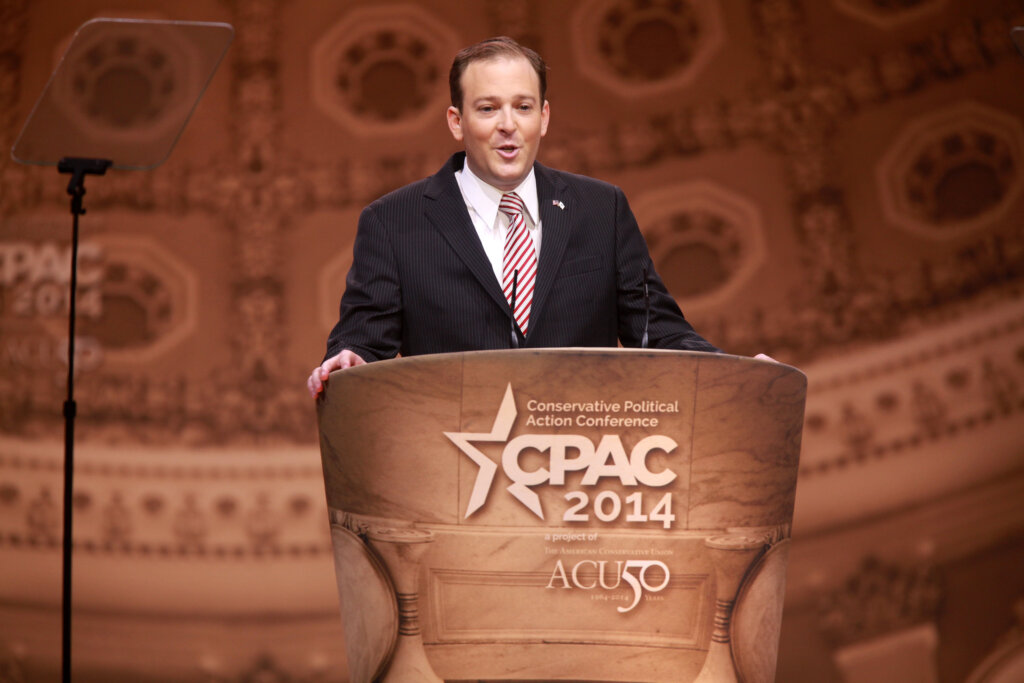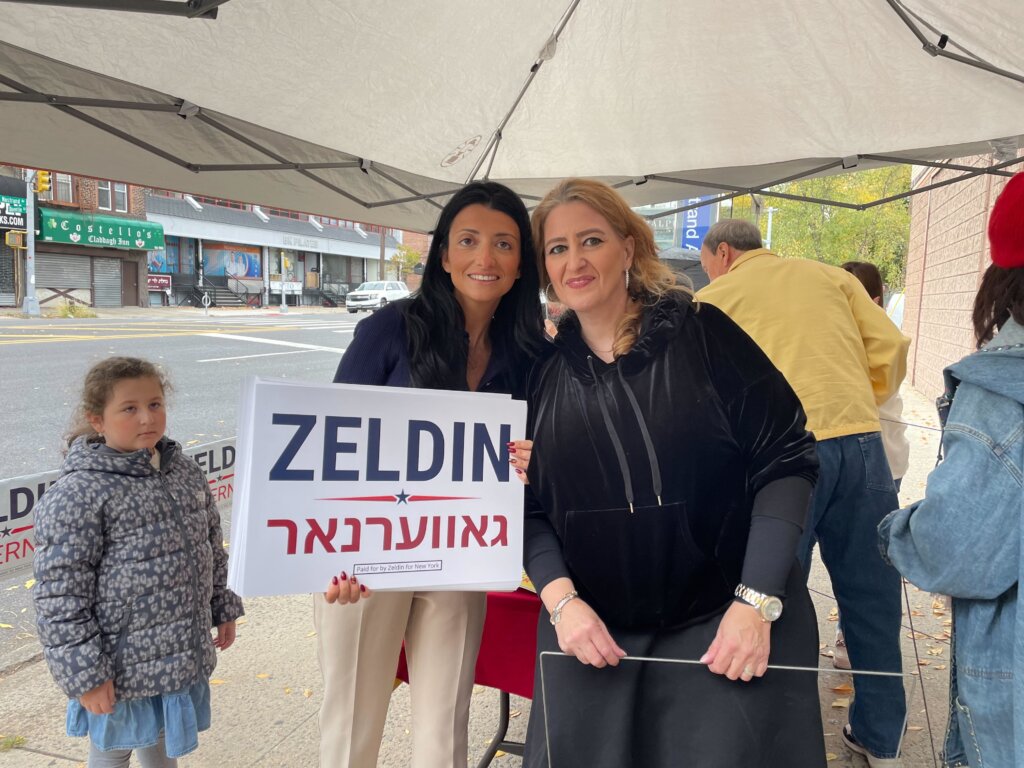Lee Zeldin, grandson of an Orthodox rabbi, gains traction in New York’s Hasidic neighborhoods
As the race for governor has tightened, the Republican nominee is counting on Orthodox supporters to help him pull of an upset

Rep. Lee Zeldin at a campaign event at the Beth Gavriel Community Center in Queens, New York, on Oct. 23, 2022. Photo by Jacob Kornbluh
New Yorkers will make history on Election Day, either electing the state’s first woman or first Jewish Republican governor. The Democratic incumbent, Kathy Hochul, and GOP challenger, Lee Zeldin, are both counting on strong voter turnout. In a state with the largest Jewish population outside of Israel, each hopes their outreach to New York’s 1.9 million Jews will give them an edge in a race that’s become far more competitive than expected according to recent polls.
“Everything is working the right way,” Zeldin, 42, said in a recent interview. He’s come from behind in dramatic fashion before. When he first ran for Congress in 2014, Zeldin in the final days of the campaign pulled ahead of his opponent, six-term Democratic Rep. Tim Bishop, after trailing him by 10 points. He ended up winning by 10 points, becoming the sole Jewish Republican member of Congress at the time.
“We are feeling very good,” he said about his current race.
Zeldin’s longshot bid has been bolstered in recent weeks by surging worry about the economy and crime — Republicans tend to fare better with voters on those issues. But he has at the same time seen his star rise with the Orthodox, an influential voting bloc that helped reelect former Gov. Andrew Cuomo in 2014 and overwhelmingly supported Hochul in the Democratic primaries earlier this year.
The Orthodox traditionally vote for Republican candidates in national elections, but their leaders have strategically backed Democratic incumbents locally in places where they are much more likely to win. Yet the continuing rise in antisemitic violence, which targets Orthodox Jews — who are most visibly Jewish — in particular, and the debate over the state’s new measure to strengthen oversight of secular studies at yeshivas, has thrown the group’s support for Hochul in doubt.
Two super PACs, “Safe Together New York” and “Save Our State,” funded by Ron Lauder, heir to the Estée Lauder fortune and president of the World Jewish Congress, have spent more than $8 million in recent weeks boosting Zeldin. That investment is paying for heavy advertising and get-out-the-vote efforts in Orthodox neighborhoods across the state. New York’s board of elections is reportedly investigating allegations that the Zeldin campaign coordinated with the super PACs in violation of state law.

Zeldin’s standing with Hasidim, who account for roughly 10% of the state’s Jewish population, surged earlier this month after he expressed strong opposition to new state regulations that apply to yeshivas, and blasted a New York Times investigative report about yeshivas’ failure to educate their students in secular subjects.
Hochul has been criticized for ignoring the yeshiva issue, but has said it is not under her purview since the state’s education commissioner, Betty Rosa, is selected by trustees who are appointed by the legislature. “Our children’s education is under attack,” reads a new full-page ad paid for by the New York State GOP. “Our communities are under attack.”
Hasidic interest in the gubernatorial election, evident on the streets of Hasidic neighborhoods and in public WhatsApp groups, is reminiscent of the enthusiasm generated for Donald Trump during the 2016 presidential election. It is largely driven by a distaste for Democrats and liberals, who many Hasidim blame for supporting a new cash bail reform law that they believe has led to rising crime rates.
Yossi Gestetner, a commentator who runs the Orthodox Jewish Public Affairs Council, said he has “rarely seen such interest in a statewide race” among Hasidim, a fast-growing community that could count for as many as 100,000 votes when mobilized. He said that if the outcome is close, Zeldin’s path will have “been through the streets of Monsey, Borough Park and Five Towns” referring to Orthodox and Hasidic enclaves in the Hudson Valley, Brooklyn and Long Island. Gestetner shared the results of an online survey by his readers that showed 82% of the 1,152 respondents picked Zeldin as their choice, while Hochul was favored by 4%.
The recent polls seem only to have fueled Orthodox zeal for Zeldin. And he has further endeared himself to the community by pledging to declare a crime emergency in New York on his first day in office and to fire Manhattan District Attorney Alvin Bragg, who has been accused by Republicans of being soft on crime. Those promises earned him the loudest applause at a recent get-out-the-vote event at a Bukharan Orthodox synagogue in Forest Hills, Queens.
Zeldin has spent a significant amount of time visiting Orthodox neighborhoods in recent weeks. He met with Hasidic rabbis and put on tefillin when he met Chabad supporters. So far the major voting blocs within the community have not backed his Democratic rival — or him for that matter.
Then there’s the boost he gets from Trump’s enthusiastic backing. The former president headlined a fundraiser for Zeldin in August at the family home of his longtime friend Stanley Chera, a real estate tycoon and prominent member of the Sephardic Syrian community in New Jersey who died from coronavirus in 2020.
The Hochul campaign didn’t fulfill a request to provide a list of its recent Jewish events, though the governor held meetings with the two most prominent upstate Hasidic rabbis during a visit to Rockland County on Sunday. She also met with the leaders of the Viznitz sect, the largest Hasidic bloc in Ramapo.
A family history with the Orthodox community
In a phone interview, Zeldin said his positions on crime and education align with what Orthodox Jews want at this moment — stronger governmental response to rising antisemitic incidents and no government interference in their way of life. “We have a real opportunity to work together to save the state,” he said.
That compatibility, he said, is rooted in his family history.
His great-grandfather Moshe Efraim “Morris” Zeldin, whom Zeldin is named after, was an Orthodox rabbi in Brooklyn. Morris Zeldin, who emigrated from Petrokov, Russia, in the early 1900s, was a pioneer in the Zionist movement and one of the organizers of the United Jewish Appeal of New York. Zeldin said that his grandfather, who died at age 86 in 1976, raised money for local yeshivas and was thanked for it by the late Chabad-Lubavitch Rebbe, Rabbi Yosef Yitzchak Schneersohn, in a 1929 letter. His great-uncle was Rabbi Isaiah Zeldin of the Stephen Wise Temple in Los Angeles, whom Zeldin invoked in a speech on the House floor in 2018.

Growing up in Suffolk County on Long Island, Zeldin said he spent considerable time his with grandfather Bernard Zeldin, who founded the Farmingdale Jewish Center. His mother, Merrill Schwartz, was a fourth-grade teacher at a yeshiva in Brooklyn.
He said that if elected as governor he would “proudly defend everything that is fantastic about a yeshiva education” which he sees as strong in its moral teachings and attendance rates.
Supporters of Hochul have pointed out that since becoming governor last year she has been committed to increasing funds to yeshivas for security grants and to boost the quality of their education. Her supporters have also run ads in Yiddish on her behalf that declare her a “trusted and reliable” ally who has stood up for the Hasidic community. In September, Hochul signed a legislative package to help ensure public schools provide high-quality instruction on the Holocaust.
Faith and freedom
Zeldin said Judaism plays an important role in his public service. “I’ve learned a lot of values from my family and from my life experiences,” he said.
He noted the premature birth of his twin daughters, Arianna and Mikayla, in 2006 while he was serving in Iraq as an Army paratrooper with the elite 82nd Airborne Division, taught him a lesson about “the miracles of modern medicine and the power of prayer” when the babies spent three months in the a neonatal intensive care unit. Zeldin posted on Facebook how they “fought like champs” despite the odds being stacked against them.
His daughters, now 16, were home alone on Long Island doing homework recently when a shooting took place outside the family’s house.
Zeldin, a member of B’nai Israel Reform Temple on Long Island, doesn’t always get to spend Shabbat dinner with his family since he’s become a member of Congress, he said. “I find myself doing Shabbat dinner with others elsewhere,” he said.
But when he’s home, the dinner table is set with different traditional dishes, including brisket, which he said is a speciality of his wife Diana, who is Mormon.
Fighting antisemitism
On the campaign trail, Zeldin often talks about the fear felt by visibly Jewish people as they walk down the street or ride the subways, worrying about a violent attack, and about antisemitism on college campuses.

In his only televised debate with Hochul earlier this week, Zeldin twice mentioned the rise in antisemitism in New York State and blamed her for not taking it seriously. A recent Anti-Defamation League report showed New York led the nation with 416 reported antisemitic incidents last year — though it’s home to more Jews than any other state. More than 577 incidents were reported in the first eight months of this year. The New York Police Department tallied 20 Jewish-related hate crime incidents in New York City last month.
Zeldin said that through school and in his four years on active duty in the army, he has “never once encountered antisemitism.” He also said he personally hasn’t experienced antisemitism within the Republican Party.
Asked about Trump’s most recent tirade against American Jews for failing to support him, and the former president’s warning that they must “get their act together … before it is too late!” Zeldin said he disapproved of Trump’s criticism. Jonathan Greenblatt, CEO of the Anti-Defamation League, described the statement as “an unveiled threat” and the White House deemed it “antisemitic.”
”The Jewish people aren’t monolithic,” Zeldin said. “It’s really important for everyone to understand that when we’re communicating with Jewish voters that there are different priorities, different values, different backgrounds and different party affiliations and what might resonate with some might not resonate with others.”
He said that having talked to Trump in the past, he understands the former president is frustrated that his policy toward Israel and his efforts to combat antisemitism on campus did not resonate with some Jewish voters. But Zeldin said his view is that “everyone out there is free to vote for whoever they want to vote for.”
Final stretch
A new poll published on Friday showed Hochul maintaining a 6-point lead over Zeldin, but crime and the economy having surpassed abortion rights and protecting democracy as priorities for voters. The governor has shifted her message to fighting crime. “You deserve to feel safe,” Hochul says in a new TV ad, a move the Republican nominee describes as an acknowledgment of how close the race has become.
Zeldin, who earned his black belt in Taekwondo in 2016, said despite his increasing momentum in the race he is nonetheless “working every day harder than the last” to pull off an upset.
“This is our last stand for New York and losing is not an option,” Zeldin said during a Sunday event held at the Beth Gavriel Community Center in Queens. “Take nothing for granted so that when you go to sleep on Tuesday, Nov. 8, you can go to sleep with a big smile, a sigh of relief and joy knowing that New York is going to be saved.”























